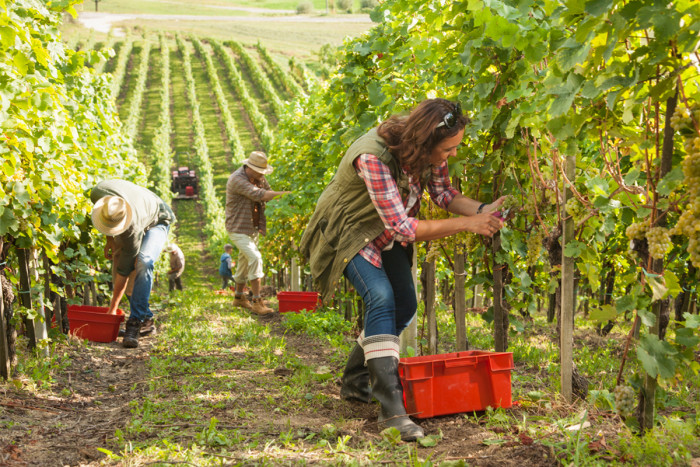Viticulturist
Kaiparuauru Kerepe
Alternative titles for this job
Viticulturists grow and harvest grapes from grapevines, and manage vineyards.
Pay
Vineyard workers and supervisors usually earn
$49K-$53K per year
Vineyard managers and viticulturists usually earn
$63K-$128K per year
Source: NZ Winegrowers, 2020.
Job opportunities
Pay
Pay for viticulturists varies depending on skills, experience and the type of work they do.
- Vineyard workers usually earn $49,000 or more a year.
- Vineyard supervisors/leading hands usually earn $49,000 to $53,000.
- Vineyard managers usually earn $63,000 to $120,000.
- Viticulturists can earn between $96,000 and $128,000
Source: NZ Winegrowers, 2020.
(This information is a guide only. Find out more about the sources of our pay information)
What you will do
Viticulturists may do some or all of the following:
- grow grapes, prune and trellis grapevines
- sell grapes to wineries
- pest and disease monitoring
- yield predicting, data collecting and reporting
- grape maturity sampling
- harvest grapes
- supervise staff
- operate machinery.
Skills and knowledge
Viticulturists need to have knowledge of:
- grape varieties, growing and harvesting methods
- vineyard pests and diseases, and biosecurity management
- how to operate vineyard machinery
- yield recording software
- weather and climate conditions, and how they affect crops.
Working conditions
Viticulturists:
- usually work eight hours a day, but may work longer hours during winter harvesting and vine pruning
- work outdoors in vineyards
- work outdoors in all weather conditions, with machinery and chemicals that may be hazardous.
What's the job really like?

Tracy Taylor
Viticulturist
What does a typical day look like?
"I drive around our vineyards, walking along the grapevines checking grape growth and ripeness, and looking for any pests and diseases. I talk to growers and vineyard managers about spray programmes and different products that can be used, or about techniques to help the grapevines grow. I also talk with winemakers about intended uses for the grapes."
How did study or training help you to get this role?
"Before studying, I liked wine but I didn’t know any winemakers. I did some research to find out what various careers in the wine industry looked like. When I started studying for my degree I met a lot of people involved in viticulture, and also worked in the industry every holidays so I got a good understanding of careers on offer and their future prospects. I have a Bachelor of Viticulture and Wine Science from the Eastern Institute of Technology."
What can you recommend about working in viticulture?
"This career is for you if you love challenges, want to work outdoors and be involved in nature,and enjoy working and socialising with like-minded, passionate people. It's a very social industry. Grapes grow in the best climates all over the world, so you get to live and work in warm, dry places that may also be by the sea."
Viticulturist video
Primary ITO gives an overview of viticulture work - 0.15 mins. (Video courtesy of Primary ITO)
Vineyards are in the best bits of New Zealand, growing world-beating wines, and you could be too with an awesome career in viticulture.
What are you into? Find your dream career here.
Entry requirements
There are no specific requirements to become a viticulturist as skills can be learned on the job. However, many employers prefer to hire viticulturists who have or are working towards a qualification. These include:
- New Zealand Apprenticeship in Wine Growing (Level 3 and 4)
- New Zealand Certificate in Horticulture – Wine Growing (Level 3 and 4)
- New Zealand Apprenticeship in Fruit Production (Level 3 and 4)
- Graduate Diploma in Viticulture
- Bachelor of Viticulture and Oenology
- Central Polytechnic website - information about viticulture qualifications
- Eastern Institute of Technology website - information about viticulture qualifications
- Nelson Marlborough Institute of Technology website - information about viticulture qualifications
- Lincoln University website - information about viticulture qualifications
The Primary Industry Training Organisation (Primary ITO) oversees wine growing apprenticeships.
Extra requirements for chemical spraying
If your job requires agrichemical spraying you need a certificate from approved providers such as Growsafe.
Secondary education
A minimum of three years of secondary education is recommended. Useful subjects include agricultural and horticultural science, business studies, maths, biology and chemistry.
For Year 11 to 13 learners, the Gateway programme is a good way to gain relevant experience and skills.
This programme may help you gain an apprenticeship, but does not reduce the amount of time it takes to complete it.
Personal requirements
Viticulturists need to be:
- able to work well in a team and under pressure
- motivated, practical and adaptable
- good communicators.
Useful experience
Useful experience for viticulturists includes:
- vineyard work
- horticulture, farm or conservation work
- driving heavy vehicles.
Physical requirements
Viticulturists need to be reasonably fit and healthy.
Find out more about training
- New Zealand Winegrowers
- www.nzwine.com
What are the chances of getting a job?
Strong demand for skilled viticulturists
Demand for viticulturists is strong due to a regional shortage of skilled workers. In recent years, the volume of grapes produced by growers has increased due to growing international demand for New Zealand wines. The number of vineyards has also grown to more than 2,000.
However, there are not enough workers to meet demand and viticulturist appears on Immigration New Zealand’s regional skills shortage list. This means the Government is actively encouraging viticulturists from overseas to work in New Zealand.
According to the Census, 3,465 viticulturists worked in New Zealand in 2018, including 1,287 grape growers and 2,178 vineyard workers.
Chances better in larger wine-producing regions
Chances of finding entry-level viticulture roles such as vineyard assistant or seasonal worker are better in larger wine-growing regions such as Marlborough, Hawke's Bay and Central Otago.
Marlborough produces about 70% of the grapes grown in New Zealand.
Most viticulturists work for vineyards or wineries
Viticulturists may work for vineyards or for wineries which own and operate vineyards.
Sources
- Adams, A, school pathways and partnerships manager, Primary ITO, careers.govt.nz interview, March 2020.
- Crennan, N, external relations manager, NZ Winegrowers, careers.govt.nz interview, February 2020.
- Immigration New Zealand, 'Regional Skill Shortage List', 27 May 2019, (www.immigration.govt.nz).
- Lincoln University, ‘Viticulture and Oenology Careers’, accessed February 2020, (www.lincoln.ac.nz).
- NZ Winegrowers, ‘Annual Report 2019’, accessed February 2020 (www.nzwine.com).
- NZ Winegrowers, ‘Vineyard Register Report 2018-2021’, accessed February 2020 (www.nzwine.com).
- Payscale, ‘Average Viticulturist Salary in New Zealand’, accessed February 2020, (www.payscale.com).
- Stats NZ, ‘2018 Census Data’, 2019.
- Westpac, ‘Industry Insight – New Zealand Winemaking 2019’, accessed February 2020, (www.westpac.co.nz).
(This information is a guide only. Find out more about the sources of our job opportunities information)
Progression and specialisations
Viticulturists may progress to set up their own vineyard or become winemakers, or move into management roles.
Viticulturists may specialise in:
- vineyard work such as pruning grapevines
- supervising or managing vineyard workers
- technical work or operating machinery
- pest and disease monitoring and control.
Last updated 25 March 2025

